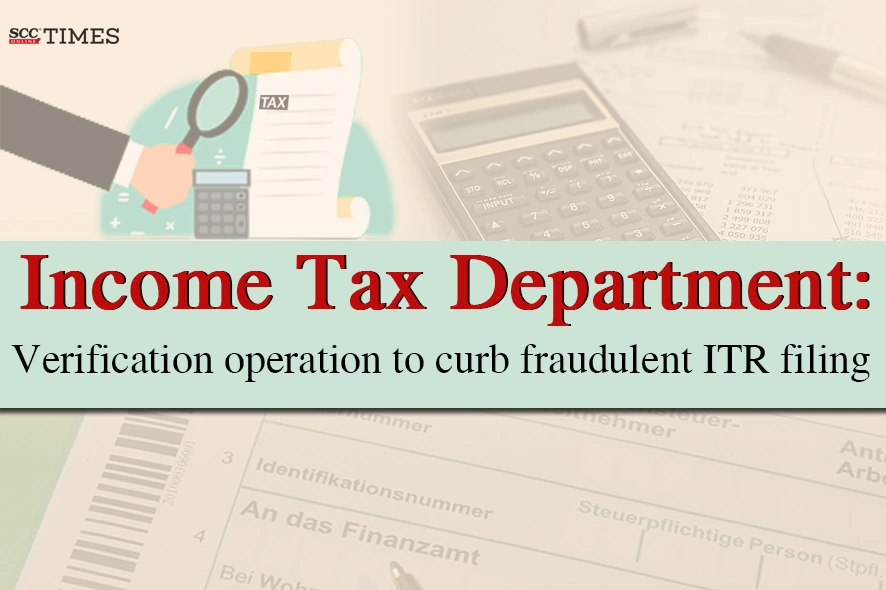On 14-7-2025, the Income Tax Department initiated a verification operation across multiple locations in the country, targeting individuals and entities facilitating fraudulent claims of deductions and exemptions in Income Tax Returns (‘ITR’) to curb misuse of tax benefits under Income-tax Act, 1961.
Need for verification operation:
- Investigations uncovered organized rackets operated by certain Income Tax Returns preparers and intermediaries by filing returns claiming fictitious deductions and exemptions.
- It has also been observed that ITR preparers often create temporary email IDs solely for filing bulk returns, which are later abandoned, resulting in official notices going unread.
- These fraudulent filings involve submission of false Tax Deduction at Source (‘TDS’) returns to claim excessive refunds.
- Taxpayers are often lured into these fraudulent schemes with promises of inflated refunds in return for a commission.
- Despite a fully e-enabled tax administration system, ineffective communication remains a significant hurdle in assisting taxpayers.
- Although many taxpayers have updated their returns voluntarily withdrawing false claims, but many of the taxpayers remain non-compliant, under the influence of the ITR preparers behind the evasion rackets.
Steps taken to identify misuse of tax benefits:
- This verification operation follows a detailed analysis of the misuse of tax benefits.
- The Income Tax Department has leveraged financial data received from third-party sources, ground-level intelligence, and advanced artificial intelligence tools to identify suspicious patterns.
- To substantiate the findings, the Department conducted search and seizure operations at the following places, across 150 premises, where evidence of fraudulent claims was found to have been used by various groups and entities:
- Maharashtra;
- Tamil Nadu;
- Delhi;
- Gujarat;
- Punjab;
- Madhya Pradesh.
- The analysis revealed the misuse of the following deductions under:
- Section 10(13-A)– House Rent Allowance (‘HRA’);
- Section 80 GGC– Deductions in respect of contributions given by any person to political parties;
- Section 80 E– Deduction in respect of interest on loan taken for higher education;
- Section 80 D– Deduction in respect of health insurance premiums;
- Section 80 EE– Deduction in respect of interest on loan taken for residential house property;
- Section 80 EEB– Deduction in respect of purchase of electric vehicle;
- Section 80 G– Deduction in respect of donations to certain funds, charitable institutions;
- Section 80 GGA– Deduction in respect of certain donations for scientific research or rural development;
- Section 80 DDB– Deduction in respect of medical treatment.
- It has been analyzed that the exemptions have been claimed without valid justification under the above-mentioned sections by employees of Multinational Corporations, Public Sector Units, government bodies, academic institutions, and entrepreneurs.
- The Income Tax Department is now poised to take stern action against continued fraudulent claims, including penalties and prosecution wherever applicable.
‘Trust Taxpayers First’ approach:
- This approach was introduced in the new Income Tax Bill, 2025.
- This approach is expected to simplify tax compliance, expand the tax base, and reduce legal disputes.
- In line with this principle, the Income Tax Department has emphasized on voluntary compliance with this approach.
- In spite of the efforts of the Income Tax Department, such as extensive outreach programs (SMS and email advisories, physical outreach programs- both on and off campus), nudging suspected taxpayers to revise their returns and pay the correct tax, many of the taxpayers remain non- compliant.
- Although approximately 40,000 taxpayers have updated their returns in the last 4 months, voluntarily withdrawing false claims amounting to Rs. 1,045 crore.
Income Tax Department has advised the taxpayers to file correct particulars of their income and communication coordinates and not get influenced by advice from unauthorized agents or intermediaries promising undue refunds.







